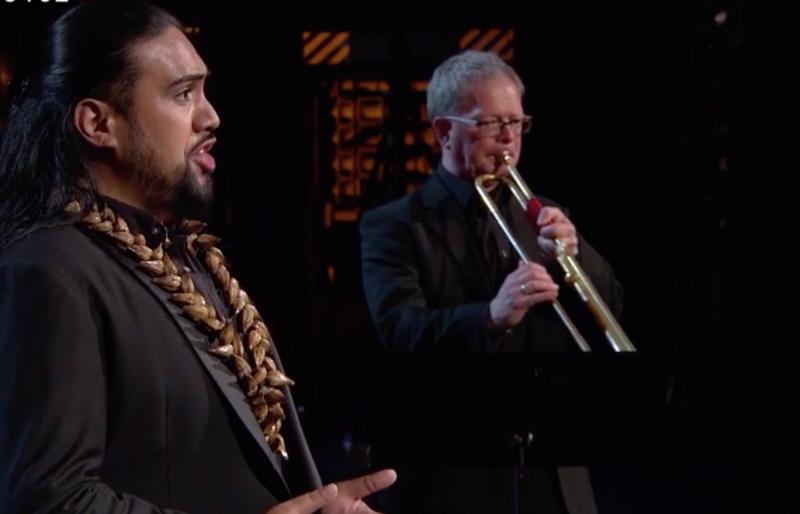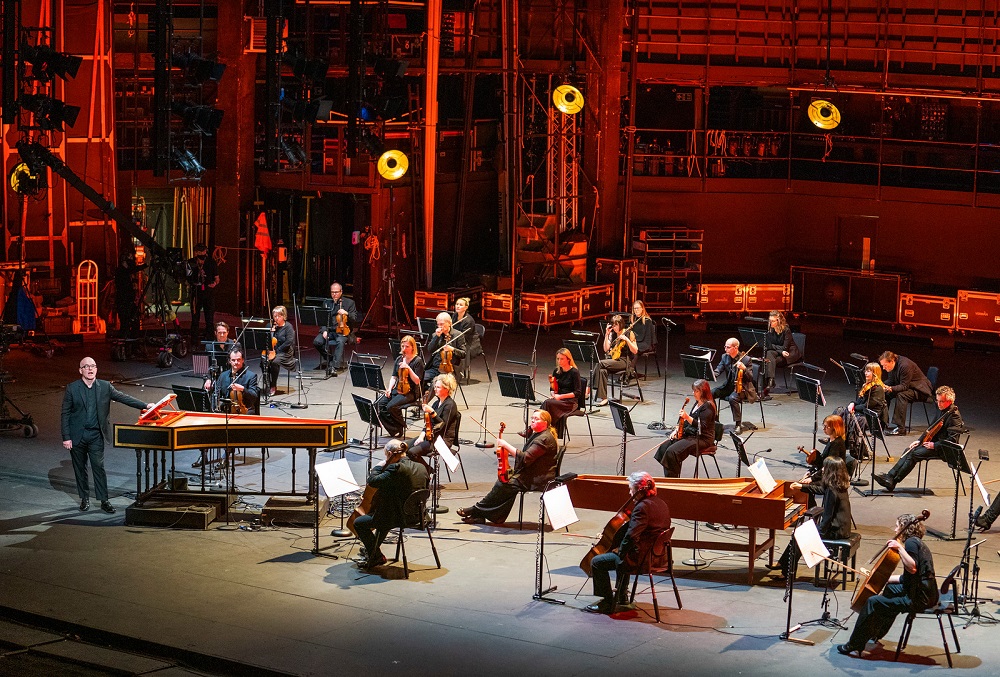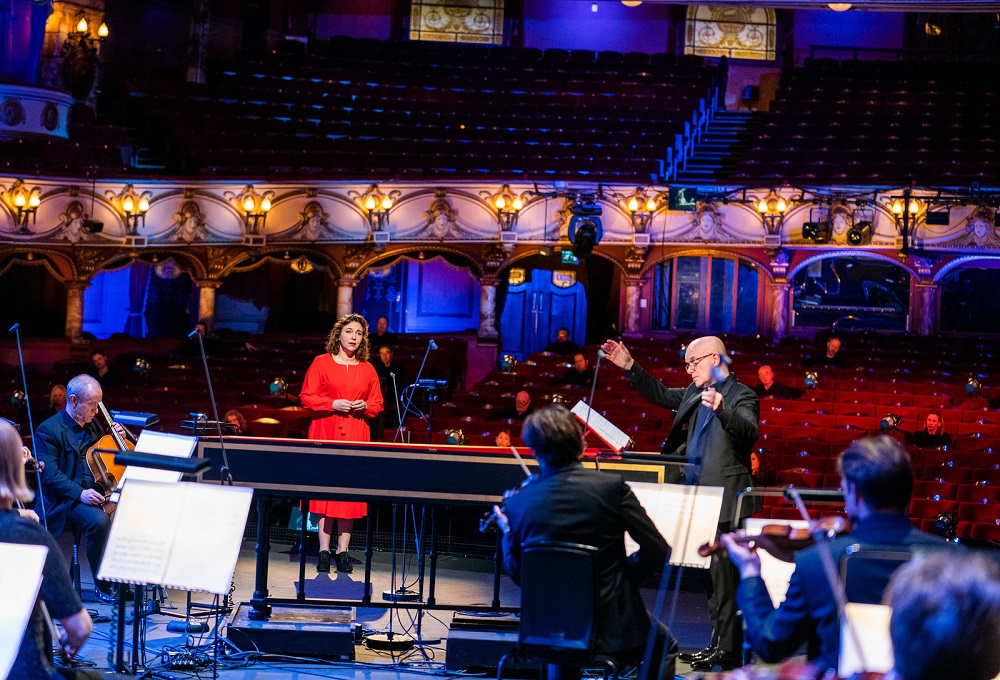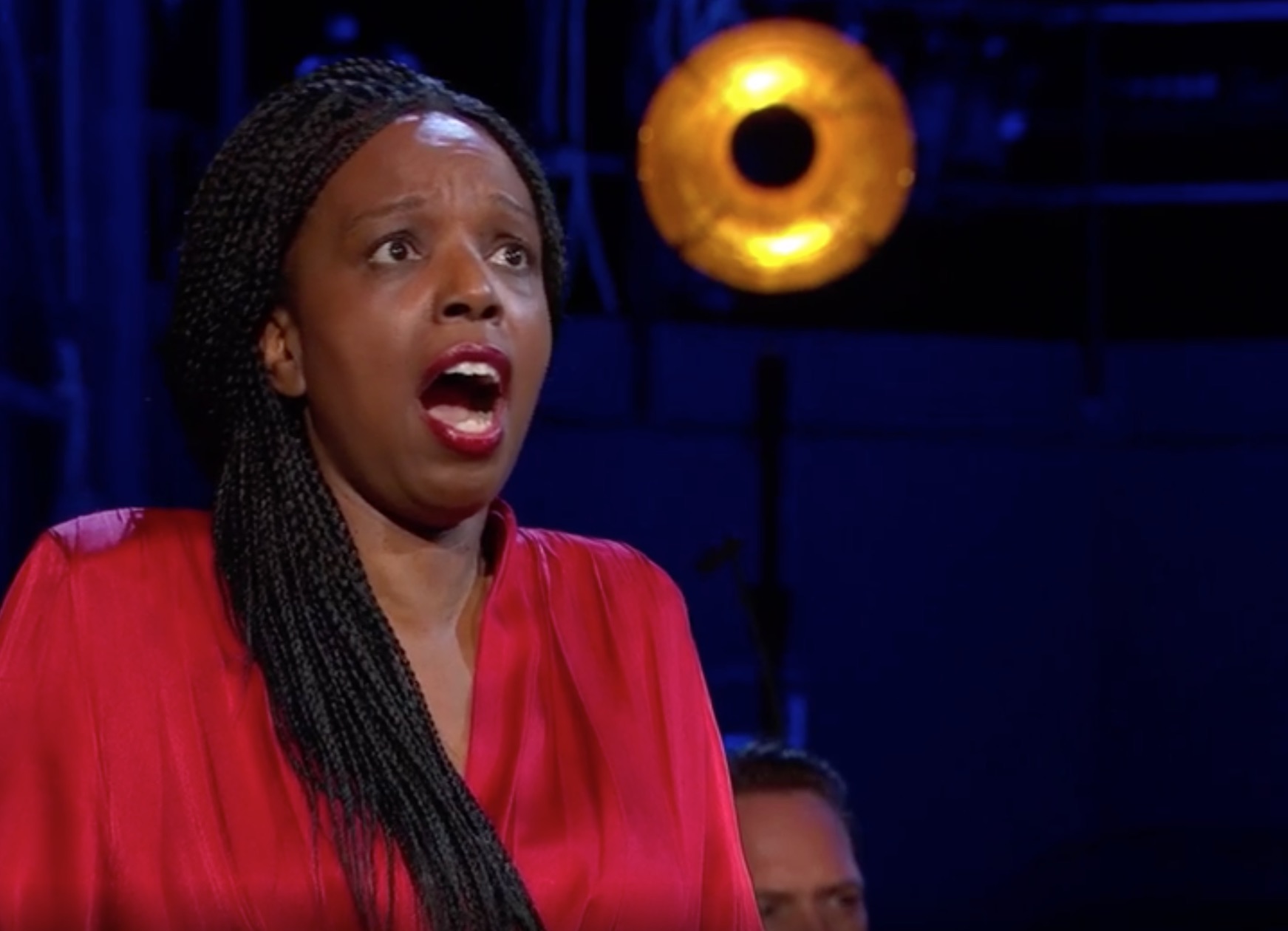Messiah highlights, English National Opera, BBC Two review – short-cut sorrow and redemption | reviews, news & interviews
Messiah highlights, English National Opera, BBC Two review – short-cut sorrow and redemption
Messiah highlights, English National Opera, BBC Two review – short-cut sorrow and redemption
Fine performances: but why this brutally truncated Handel?

Well, it wasn’t quite Messiah, but it was a source of joy. In ENO’s end-of-lockdown staging, BBC Two’s transmission of Handel’s resurrection song delivered a scant 54 minutes of music from the Coliseum on Easter Saturday.
Given that the on-screen presenters rightly flagged up the timeliness of Handel’s peerlessly uplifting journey through desolation into hope, would it really have ruined the day's ratings to record the work in its entirety and (at the very least) post the whole thing on iPlayer? In the event, the ENO could only offer us a savagely sawn-off Messiah. It lacked (for example) “For unto us a child is born”, “O thou that tellest good tidings to Zion”, “All we like sheep” and “Lift up your heads, O ye gates”… The chorus drew the shortest straws of all.  Rant over. What we had was generally splendid. Laurence Cummings directed the ENO’s orchestra (pictured above) and chorus, tautly and vigorously, from behind his keyboards, leaping into action when the climactic moments rolled around. With the band socially distant on stage, the choir members filled the Coliseum auditorium at similarly decent intervals. Eight soloists, who came off best from the BBC’s truncation, occupied both stage and (sometimes) boxes, with trumpets too blasting out from up aloft. Heavy pruning excised many of Messiah’s “Christmas” elements. The balance of the extracts that survived tilted towards the “Easter” themes of renewal and rebirth. If that made seasonal – and topical – sense, having the confidence to broadcast the whole voyage through darkness into light would have made even more.
Rant over. What we had was generally splendid. Laurence Cummings directed the ENO’s orchestra (pictured above) and chorus, tautly and vigorously, from behind his keyboards, leaping into action when the climactic moments rolled around. With the band socially distant on stage, the choir members filled the Coliseum auditorium at similarly decent intervals. Eight soloists, who came off best from the BBC’s truncation, occupied both stage and (sometimes) boxes, with trumpets too blasting out from up aloft. Heavy pruning excised many of Messiah’s “Christmas” elements. The balance of the extracts that survived tilted towards the “Easter” themes of renewal and rebirth. If that made seasonal – and topical – sense, having the confidence to broadcast the whole voyage through darkness into light would have made even more.
Yet it was hard to go on feeling furious at the BBC executive class once Anthony Gregory, a lone, yearning prophet in the desert of the Coliseum stalls, implored us to “Comfort Ye”. Yes, first-rate singing should ideally always come from the heart; but there was an unmistakable quality of warmth, fervour and even gratitude, in this and later arias, that made the occasion special, if far too short.  Cummings neatly adjusted tempi and dynamics to accentuate Handel’s rapid shifts of mood (made more breakneck by the compression). He did fine work with the tension-building slowdowns, and the shock accelerations, that give Messiah its quasi-operatic pace and edge. The sinuous lines in “Behold the Lamb of God” had a well-weighted, sculptural majesty, while the show-stopping turns – the “Hallelujah” and “Amen” choruses – featured passages of hushed precision to complement their shock-and-awe force.
Cummings neatly adjusted tempi and dynamics to accentuate Handel’s rapid shifts of mood (made more breakneck by the compression). He did fine work with the tension-building slowdowns, and the shock accelerations, that give Messiah its quasi-operatic pace and edge. The sinuous lines in “Behold the Lamb of God” had a well-weighted, sculptural majesty, while the show-stopping turns – the “Hallelujah” and “Amen” choruses – featured passages of hushed precision to complement their shock-and-awe force.
The effect of this cut-and-paste Messiah, though, was to push the oratorio in the direction of a sacred cabaret of solo turns. Iestyn Davies’s countertenor lent a wistful, even tender, colouring to “But who may abide the day of His coming”, transmitted from the heavens of his box. For “He was despised”, the great Christine Rice (pictured above) reined in the melodramatic raw despair we sometimes hear, and voiced instead a near-unbearable sense of quiet abandonment. In “I know that my Redeemer liveth,” Nadine Benjamin (pictured below) bloomed towards the aria’s end into an enraptured, deep-souled intensity that would have brought a full house down. This really was singing meant to save a suffering world.  Other pleasures waymarked our brief heaven-wards journey, not least the duet of Benson Wilson’s serenely mellow bass and Robert Farley’s clarion brass in “The trumpet shall sound”. “Worthy is the Lamb” powered into the “Amen” on a rolling swell of choral sound that broke in a triumphant wave. All too soon, the road to healing and redemption reached its end. I was left delighted even by these meagre rations, but frustrated by the lack of BBC self-belief that shrank a perfect musical reflection of this Easter’s mood of tentative recovery into an edited-highlights show. More than a decade ago, and also with Laurence Cummings at the helm, Deborah Warner’s production at the Coliseum set Messiah partly inside a hospital, where the sick rose from their beds as pain and grief finally yielded to hope. As I recall, it wasn’t perfect, but now might be just the moment to revive that staging – at a proper length.
Other pleasures waymarked our brief heaven-wards journey, not least the duet of Benson Wilson’s serenely mellow bass and Robert Farley’s clarion brass in “The trumpet shall sound”. “Worthy is the Lamb” powered into the “Amen” on a rolling swell of choral sound that broke in a triumphant wave. All too soon, the road to healing and redemption reached its end. I was left delighted even by these meagre rations, but frustrated by the lack of BBC self-belief that shrank a perfect musical reflection of this Easter’s mood of tentative recovery into an edited-highlights show. More than a decade ago, and also with Laurence Cummings at the helm, Deborah Warner’s production at the Coliseum set Messiah partly inside a hospital, where the sick rose from their beds as pain and grief finally yielded to hope. As I recall, it wasn’t perfect, but now might be just the moment to revive that staging – at a proper length.
rating
Explore topics
Share this article
Add comment
The future of Arts Journalism
You can stop theartsdesk.com closing!
We urgently need financing to survive. Our fundraising drive has thus far raised £49,000 but we need to reach £100,000 or we will be forced to close. Please contribute here: https://gofund.me/c3f6033d
And if you can forward this information to anyone who might assist, we’d be grateful.

Subscribe to theartsdesk.com
Thank you for continuing to read our work on theartsdesk.com. For unlimited access to every article in its entirety, including our archive of more than 15,000 pieces, we're asking for £5 per month or £40 per year. We feel it's a very good deal, and hope you do too.
To take a subscription now simply click here.
And if you're looking for that extra gift for a friend or family member, why not treat them to a theartsdesk.com gift subscription?

Comments
What is he wearing around his
Benson Wilson is New Zealand
I think it may be a necklace